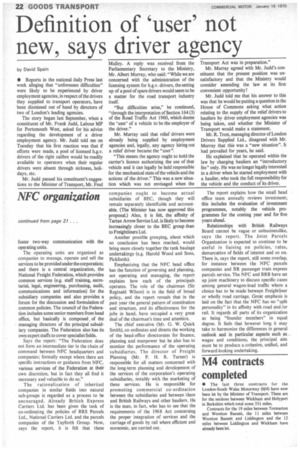Definition of 'user' not new, says driver agency
Page 24

If you've noticed an error in this article please click here to report it so we can fix it.
by David Spain • Reports in the national daily Press last week alleging that "unforeseen difficulties" were likely to be experienced by driver employment agencies, in respect of the drivers they supplied to transport operators, have been dismissed out of hand by directors of two of London's leading agencies.
The story began last September, when a constituent of Mr. Frank Judd, Labour MP for Portsmouth West, asked for his advice regarding the development of a driver employment agency. Mr. Judd told me on Tuesday that his first reaction was that if efforts were made, a pool of licensed h.g.v. drivers of the right calibre would be readily available to operators when their regular drivers were absent through sickness, holidays, etc.
Mr. Judd passed his constituent's suggestions to the Minister of Transport, Mr. Fred Mulley. A reply was received from the Parliamentary Secretary to the Ministry, Mr. Albert Murray, who said: "While we are concerned with the administration of the licensing system for h.g.v. drivers, the setting up of a pool of spare drivers would seem to be a matter for the road transport industry itself.
"But difficulties arise," he continued, -through the interpretation of Section 164(3) of the Road Traffic Act 1960, which deems the 'user' of a vehicle to be the employer of the driver."
Mr. Murray said that relief drivers were already being supplied by employment agencies and, legally, any agency hiring out a relief driver became the "user".
"This means the agency ought to hold the carrier's licence authorizing the use of that vehicle and it can legally be held responsible for the mechanical state of the vehicle and the actions of the driver." This was a new situation which was not envisaged when the Transport Act was in preparation."
Mr. Murray agreed with Mr. Judd's constituent that the present position was unsatisfactory and that the Ministry would consider amending the law at its first convenient opportunity!
Mr. Judd told me that his answer to this was that he would be putting a question in the House of Commons asking what action relating to the supply of the relief drivers to hauliers by driver employment agencies was being taken, and whether the Minister of Transport would make a statement.
Mr. R. Trott, managing director of London Drivers Supplied Ltd., disagreed with Mr. Murray that this was a "new situation". It had prevailed for years, he said.
He explained that he operated within the law by charging hauliers an "introductory fee" only. He was no longer legally interested in a driver when he started employment with a haulier, who took the full responsibility for the vehicle and the conduct of its driver.
































































































